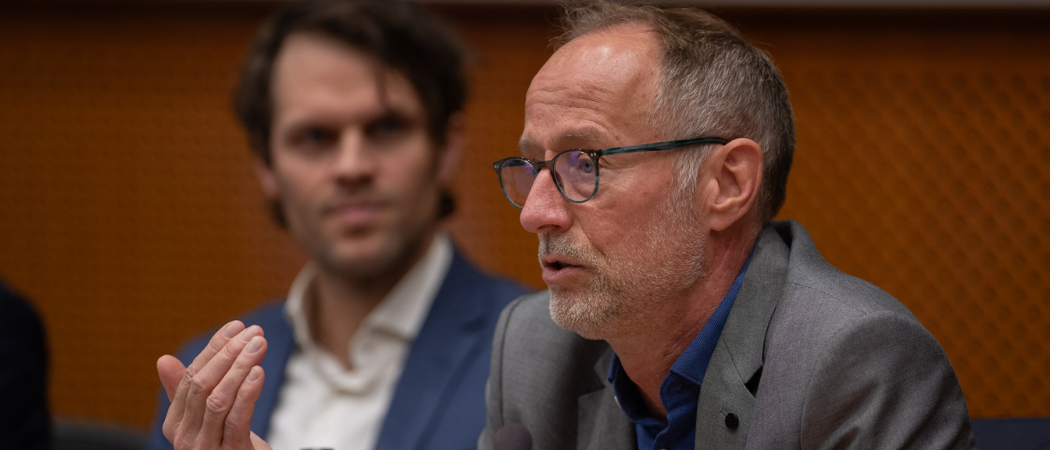The first EU-funded research project into psychedelic drugs is a step on the way to legitimise the field and should lead to more funding

Robert Schoevers (right), principal investigator for the PsyPal project, speaking at the European Parliament on Tuesday 9 April. Photo credits: Simon Blackley
Increasing awareness of mental health issues has not yet been translated into innovative treatments, MEPs heard on Tuesday at the launch of PsyPal, the first EU-funded clinical research project into psychedelic-assisted mental health treatments.
“As our understanding of psychedelics deepens, it becomes increasingly evident that they could revolutionise mental health care, and also other diseases like neurological diseases,” Greens MEP Tilly Metz said at the launch of the €6.5 million Horizon Europe project.
PsyPal will investigate the potential of psilocybin-assisted therapy to ease anxiety and depression in patients in palliative care. It will focus on patients with chronic obstructive pulmonary disorder, multiple sclerosis, amyotrophic lateral sclerosis, and atypical Parkinson’s disease.
The project involves 19 organisations from nine European countries, with around 100 patients due to be recruited at four different clinical sites across Europe.
Tuesday’s event was hosted by MEP Cyrus Engerer, and held under the auspices of the Brain Health & Neurological Conditions MEP Interest Group and the MEP Action Group for the Medical Use of Psychedelics. MEPs were eager to look ahead beyond the current study to their future role in shaping regulations.
“As we move forward there will come a time when we’re tasked with designing a regulatory framework that strikes a balance between accessibility and safety,” Metz said. Evidence-based studies like PsyPal will be crucial to the work of legislators.
“We need to establish a supportive regulatory environment,” said S&D MEP Radka Maxová. “This involves creating guidelines for the safe production, distribution and administration of psilocybin, and ensuring it is only used in a very clear and appropriate context.”
Regulations should also include standards for training the healthcare professionals who administer these therapies, she said.
The EPP’s Tomislav Sokol, co-rapporteur for the European Health Data Space, said MEPs will need to push for more money for health in the next long-term EU budget, including for research.
“Fighting for the budget will be of extreme importance if we want to have a strong common European health policy, and I think brain disorders are one area where we can probably do the most,” he said.
Sara Cerdas MEP, of the S&D group, compared the lack of innovation in mental health treatments to the struggle to develop new antibiotics. She was the rapporteur for the Parliament’s own-initiative report last year, which called on the Commission to create a mission on mental health in Horizon Europe and the next framework programme.
Europe lagging behind
Use of psychedelic drugs is for the most part illegal across Europe and the United Nations classifies them as schedule 1 drugs that have no accepted medical use.
However, research suggests they have significant potential for managing mental health disorders such as post-traumatic stress disorder, anorexia and depression, and last year Australia became the first country to officially regulate the medical use of psychedelics. MDMA-assisted therapy for PTSD is also expected to be approved in the US this year.
The European Medicines Agency (EMA) though did not approve any new treatments for psychological conditions in 2022 or 2023.
The PsyPal research team is aiming to start dosing patients in January 2025, with the trial running for two years.
“If you look at psychopharmacology, it’s been relatively quiet for quite a long time, and now there is an increase in studies and funding which I think is hopeful,” principal investigator Robert Schoevers told Science|Business.
The EMA is closely following developments, and will hold a workshop in Amsterdam next week to discuss the future regulatory framework.
One challenge for regulators is that psychedelic therapies represent a break from existing treatments, which either involve pills patients take at home, or psychotherapy. “This is a pill within the context of psychotherapy,” Schoevers said.
The fact psychedelic treatments are labour-intensive, requiring infrastructure and trained healthcare professionals to administer them, can also discourage industry from investing in their development.
“From a pharma perspective, if you produce a drug you can prescribe only once or twice, and the rest is non-pharma, there are unanswered questions about how you approach that,” Schoevers said.
“No big pharma company has really been investing yet in psychedelic therapies,” Tadeusz Hawrot, founder of the Psychedelic Access and Research European Alliance (PAREA), told Science|Business. “They are very interested and looking from a distance, but still waiting to see approvals, and also the business model.”
Most of the clinical research is being done by small biotech firms that prefer to focus on the US market, he said.
Hawrot says there is support from the European Commission for researching the use of psychedelics to address unmet medical needs, potentially through a call as part of public-private partnership the Innovative Health Initiative, but there so far “hasn’t been an appetite to engage in a collaborative project” from Europe’s large pharmaceutical associations.
Members of the health and research community can propose ideas for call topics within the IHI, which has a budget of €2.4 billion, via the IHI Ideas Incubator.
The Commission is due to launch a new partnership on brain health next year. “We see this as a big opportunity because it will also be bringing in member states,” Hawrot said.
PAERA will also be on the lookout for possibilities within the general Horizon Europe programme, for example under Cluster 1 ‘Health’, for which the call topics are broadly defined.
“We will be creative, just like PsyPal. This was not a call tailored to psychedelics, but calls are open, and everyone can find their own angle,” he said.
Charlotte Marchandise, executive director of the European Public Health Association (EUPHA), will also be keeping a close eye on the PsyPal results. Such projects are vital because research for mental health treatments is lacking, and more evidence-based prescription is needed, she says.
She gives the example of transcranial magnetic stimulation (TMS), a non-invasive form of brain stimulation which, like psilocybin, requires the presence of healthcare professionals. Because it is expensive, it is only used when other treatments such as antidepressants have failed, event though it has been shown to have fewer side effects, she said.
“All this research is either too expensive to test or doesn’t have any outcome for industry, so they’re not developed,” Marchandise told Science|Business. EU backing is vital to ensure treatments are developed, and then scaled up.
As well as more funding, she wants to see progress towards harmonised regulations and a standardised testing framework across the EU. Psilocybin for example can be tested in some European countries, but not others. “Innovation requires more agility, and Europe can give us that. I know many researchers in France cannot do the same tests they do in Portugal,” she said.
WHO Europe estimates that three out of four people with major depression do not receive adequate treatments.





 A unique international forum for public research organisations and companies to connect their external engagement with strategic interests around their R&D system.
A unique international forum for public research organisations and companies to connect their external engagement with strategic interests around their R&D system.